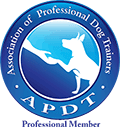Archive CF :: The Dangers of Anthropomorphism
Understanding your Dog's Inner Puppy
A client recently described how her Maltese Fidget (*) looked her square in the eye as she squatted proudly in the middle of her favorite furry rug, peed, and then gleefully gave chase. Fidget was being spiteful, said my client ruefully. How could she be so stubborn and recalcitrant? After all, Fidget knew where her wee wee pad was!
Well, I know Fidget pretty well; she's an attention-aholic. She can usually get the attention she craves just by nature of her cuteness. But, when she can't, when the humans around her are talking amongst themselves, she will devise some dastardly deed to recapture the attention she seeks. Through trial and error, Fidget has discovered that there's no better way to get a rise out of her humans, and even to start a fun game of chase, than to pee in the middle of that nice rug. So she happily offers her invitation to the game, giving a come-hither look as she squats and goes, a look that she might just as easily have used while grabbing a toy for a spirited game of tug.
My client committed the cardinal sin of anthropomorphism, the granting of human thoughts and motivations to non-human beings. We concoct in our heads why we would behave in such a way and then attribute it to our dogs. Unfortunately it leads to nothing but misunderstanding, miscommunication and, worst of all, misplaced punishment. Too often, the human in this situation would respond by yelling at the dog, chasing her, maybe even grabbing her collar to roughly take her over to the spot where she pottied. But what does this look like from a dog's perspective? Perhaps: "Oh, goodie, you're chasing! I love this game! Yippee! Oooh, you've collared me! You're playing so rough?! Hey, you're dragging me to the rug. Hmmm, yes, that's my pee! Remember? I just did that so you'd play! Yes, I'm glad I did, too! But you're playing so rough! It's a little scary!" This last part is usually accompanied by appeasement gestures -- low body posture, low tail wag -- all of which looks to us like guilt or apology.
It's a body language dialog gone terribly awry.
Dogs seem so much like us, so social and fun-loving and so attuned to our emotional states, that we can't seem to keep ourselves from thinking that they're really just furry humans. Alas, the wonderful attributes of dogness are thus lost.
So how did I counsel Fidget's mom on Fidget's inner puppy? My prescription: Give Fidget plenty of exercise, initiate play on her terms rather than the dog's, reward Fidget for pottying in the right places as well as for quiet, independent activities, and offer the pup interactive puzzle toys to entertain and stimulate her mentally.
Mind-reading has never been a strong suit of ours, with other humans or with canines. The best we can hope to do, at least when it comes to our dogs, is to observe their behaviors and then devise ways of encouraging those behaviors we like and diminishing those we don't. Just remember: Every single one of them, from giant to teacup, no matter how smart or cute or cuddly, is 100% dog through and through!
(*) Names have been changed to protect the innocent.




